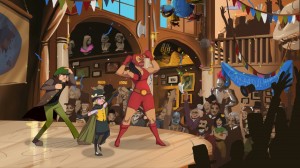Trending
Opinion: How will Project 2025 impact game developers?
The Heritage Foundation's manifesto for the possible next administration could do great harm to many, including large portions of the game development community.
Today's post is all about tough love and a question that every game designer needs to answer about their game

Recently we had another great Perceptive Podcast chat on the subject of the Indie market. On the cast, the topic of the bar of game design and releasing a game came up. Talking about it more, we came to the realization that all this talk about designing and marketing your game comes down to one tough question that you must answer about your game.

The number of games being released has grown, but our time hasn't. For every unique game that is being released, there are dozens more coming out daily. With that said, when deciding what games to cover, play, review, spotlight, etc, there's one question we need to know: What's the Point?
Why should I give your game 1 minute of my time, let alone 30? In a Critical Thought, I talked about the balance of uniqueness vs. refinement with games. Indie games can be very unique, but lack polish for one reason or another. AAA games are very polish, but usually feature the same gameplay we've seen time and time again.
Every barrier in your game brings up that question. Something that annoys me one minute in is going to only get worse when we're talking about hours of play. Uniqueness these days is not unique: As you're reading this right now, there's a good chance that at least a dozen games were released the same day. If a game annoys me even just once, there's always another game to play.
With refined games, we've seen this gameplay before. If I already played Farcry 4 (or Shadows of Mordor, Mad Max, etc) why should I give the next Farcry or Assassin's Creed a shot? Like-wise, if you're developing your own take on a popular genre, why should I play your game instead of an existing series?
While I've been talking about things from a reviewer standpoint, this question also extends to the game's development as well.
Game development is a very risky profession. For every game that makes a profit, there are dozens, if not hundreds that don't. As we've talked about, being successful in today's market requires the thinking of both the artist and the businessman. Both roles require a lot of different skills working on your game.
However, all that doesn't mean a thing if you don't have a worthwhile idea in the first place. Besides just being able to sell your game, our little question also has to do with playing it as well. We've seen many indie games that are great ideas, but never go anywhere with them.

renowned explorers
Standing out can be trouble in different ways for unique or refined titlesMultiple times on Game-Wisdom, we've talked about the concept of harmonizing game design, and it once again matters here.
The indie market is full of games that either come off as half-baked, or are nothing more than a simple mechanic that get's stretched out to hours of play.
On our cast, we talked about the difference between trying to copy another game and elevating a design. If your game idea is nothing more than: "It's just like X," then just stop right there, you're done. Trying to directly compete with another game that's popular is the same thing we saw with the mobile market and the MMO market before that.
A good idea would be, "It's just like X, but this is different." You can say Stardew Valley was similar to the Harvest Moon/Rune Factory games, but there were elevated elements in it. There are several posts waiting to be written about what it means to elevate design, but it's too big to go into detail about here. If you can't answer what's the point of your game, don't think that the consumer will be able to.
Getting the balance right between making something original and having familiar elements to make it accessible is a tough job. Once again we can see the extremes: An indie game that may have unique gameplay, but requires a lot of time spent to understand it, or an AAA title that is very accessible, but we've seen this all before.
Both sides of the scale require the designer to sell their game, and that takes us to our final point.
We've talked countless times about the importance of understanding PR and the market for game developers. If your game is truly amazing, then there's a good chance it will rise to the top on its own.
With that said however, designers still have to understand how to pitch their game. Going back to the scale from the last part, both sides have their work cut out for them. Unique games require the designer to be able to explain just what the hell the game is about.

Stardew valley
If your game doesn't have a strong opening launch, that can spell trouble for discoverabilityThe problem is that the more unique your title is, the harder that becomes.
Let me ask you, could you explain the mechanics of a game like Stellaris or Renowned Explorers in 10 seconds to someone?
I know I could do it with a game like Stardew Valley or Super Meat Boy; even something like the Talos Principle or Braid.
For games based on existing designs, the challenge is this: How do you convince your game is worth playing? If I already played League of Legends, why should I try DOTA 2? Assassin's Creed vs. Shadow of Mordor, Call of Duty vs. Titanfall and so on. If your game is inspired by a popular title, you have your work cut out for you to convince people that you're not just copying someone.
The AAA market is built around franchises and major studios. Whenever someone releases a successful title, we know that other studios will look to it for inspiration. However, when everyone is taking from the same source, it makes it that much harder to stand out.
Following GTA 3, we saw everyone embrace open-world games; World of Warcraft: MMOs, Call of Duty: Shooters and so on.
Here's the final point of trouble: Consumers are exposed to all this at the same time. We're trying to make sense out of the dozens of Indie games being released at the same time we're comparing different shooters, stealth games and so on.
Throw in our limited time to play, and I have to ask you this again: What's the Point of Your Game?
I do believe that we are heading for a shakeup at the lower end of the market. We're not going to have an "Indiepocalypse," but the market is heading towards a restructuring.
As developers, the bar has been raised thanks to the number of standout studios. For everyone else, your job to convince me to play your game has become a lot harder. Even doing my best not to stay on one game for long, I'm still not able to play all the high profile games, much less the ones that aren't getting attention.

Duskers
The Indie market has raised the bar on quality gamesI know with that said, someone may be getting ready to write a snide comment along the lines of, "Maybe you're not doing your job," or, "Why are you complaining about having too many games?"
The point is that if someone who is trying to cover games professionally is having a hard time keeping up, what hope does the consumer have in finding your game?
I'm going to once again end my posts with this message. For any Indie developer with an interesting concept for a game that you're having a hard time getting people to try, please get in touch with me. You can email me at josh*at*game-wisdom.com and I'll do my best to at least give your game a video spotlight.
If you enjoyed this post, please consider donating to the Game-Wisdom Patreon campaign. Your donations can help to keep the site going and allow me to produce more great content. Follow me on Twitter @GWBycer, and you can find daily video content on the Game-Wisdom YouTube channel.
Read more about:
BlogsYou May Also Like